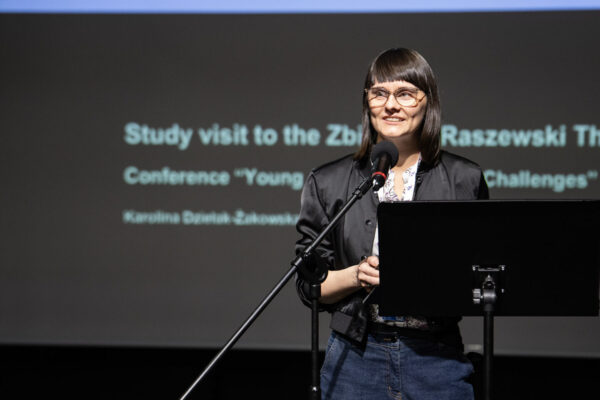
On April 10, 2025 the Zbigniew Raszewski Theatre Institute hosted in Jazdów a study visit as part of the international conference “Young Artists – Challenges and Reality”. The guests were invited to hear presentations outlining the situation of young Polish scenographers, producers, theatre critics, and artists and theatre creators, especially in the context of institutional support for young theatre directors. The presentations were followed by a guided tour of the Institute. The meeting was opened by Deputy Director for Programming Anna Galas-Kosil.
The study visit accompanied a conference organized by the Ministry of Culture and National Heritage within the framework of the Poland’s EU Council Presidency.
Below, the speech of Krystyna Mogilnicka, Head of the International Cooperation Department.
Before I speak, I would like to show you a video about the Polish Student Exhibition for the Prague Quadrennial of Performance Design and Space in 2023. The exhibition was created by a young artist and scenographer, Ksenia Makała. The exhibition was called Asylum and it won the “Responsiveness to Urgencies” award in the category of Student Exhibitions at the PQ 2023.
The Institute has been producing main exhibitions for the PQ for the last (nearly) 20 years, since the beginning of its operations. And I will tell you more about it after the video, it is 5 minutes long.
The film was also shot and edited by a young, emerging video artist, Alicja Borowiec, whom we invited to Prague in 2023 to document the process and the exhibition. She worked there with an experienced videographer, Michał Januszaniec.
What you have seen in the video is a PQ 2023 venue, which for the Student Exhibition was outdoors, on the Holešovice Market (Holešovická tržnice). The curatorial concept of the PQ – Rare Stories of Unique Places – was to invite young artists to tell us more about their home places. In the open call for the Student Exhibition, which we launched in 2022, we asked for a proposal that responded to the situation on the Polish borders and inland, with migrants from the invaded Ukraine, and the very intense and unique situation that was happening for a few months, when so many grass-root initiatives emerged in society to help deal with the situation.
The applications for the open call were anonymised, so the jury did not know if it was an individual artist or a collective. In addition to experienced scenographers, the jury included Anna Kaczkowska, an emerging artist who participated in the previous Student Exhibition in 2019, so an expert on the event.
For Ksenia Makała – then a student at the Academy of Fine Arts in Katowice and a graduate of the Faculty of Architecture at the Silesian University of Technology – it was her first production; she had already won some awards with her projects, but in fact she had never had the chance to realise them.
The whole process of creating this exhibition took 6 months. We established fair working conditions for Ksenia (with a fair fee that was not smaller than the fee for the artists who created works for the Exhibition of Countries and Regions, a clear contract, etc.). She worked with an experienced scenographer, Prof. Marek Chowaniec, whom you have heard in the video as a mentor, to discuss ideas and solve technical problems. And she worked with experienced producers, Karolina Dziełak-Żakowska and myself. We supported Ksenia in the process of transforming the idea into an object; helping her to find a company to produce the object, to manage the safety requirements for the exhibition site and the audience, to manage the budget, etc. However, we did not create the exhibition for her – it was Ksenia who talked to the company, to the seamstresses who sewed parts of the object so that the effect would be close to the imagined one. We listened to Ksenia’s ideas and helped her to realise them; we also supported her in such details as creating PR materials, navigating her through the communication strategy, talking to the media, etc. But we also invited her to fully experience the Prague Quadrennial as an event by securing a budget for the people who would be responsible for the exhibitions during the time she was not overseeing it herself.
This is a case study showcasing the way we work with young theatre scenographers on this project. For the future Student Exhibition in 2027, we plan to involve a young producer to produce the exhibition with our mentorship. And we plan to secure funding so that more young scenographers can come to experience the PQ as active visitors.
After the PQ we managed to have an artistic follow-up with Ksenia – we produced a workshop for families with children on the theme of the Asylum project – Ksenia created it together with a choreographer, Anna Wańtuch, who has experience of working with children and families. The workshop combined body work with the creation of objects. At the moment we know that both artists are looking for resources to create a full theatre production based on the theme of Asylum. We are also happy that we were able to present the exhibition one more time, in May 2024 in Katowice in the Silesian Museum, in the Centre for Polish Scenography during the Night of Museums, so that over 1700 people in Poland saw it, and Ksenia had the opportunity to talk about her project one more time. The exhibition was accompanied by a workshop for children and families, and an opportunity for the public to express what Asylum means to them by writing words on a board.
At the end of my presentation, I would like to read a statement from the PQ jury about Asylum: A poetic contrast between the real and the metaphorical, the ability to touch on the crisis with a clear and profound simplicity. Up, the volatile ceiling is safe but precarious. Down, the human solidarity that eases hunger, thirst and cold, also safe and provisional.
We are happy to have been able to support this artist in the realisation of her vision. Thank you.


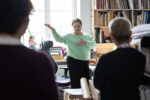
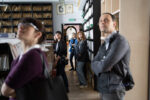
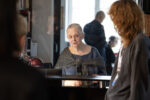
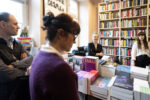
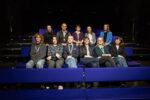
The visit was prepared by Karolina Dziełak-Żakowska, dr Krystyna Mogilnicka, Magdalena M. Ożarowska and Adrianna Wolińska; Maria Dworakowska, Agnieszka Wielecka, Jolanta Żmijewska and Justyna Szczepaniak talked about the Library, the Theatre Documentation Department and the “Prospero” Bookstore.
 Case study of the Student Exhibition 2023
Case study of the Student Exhibition 2023